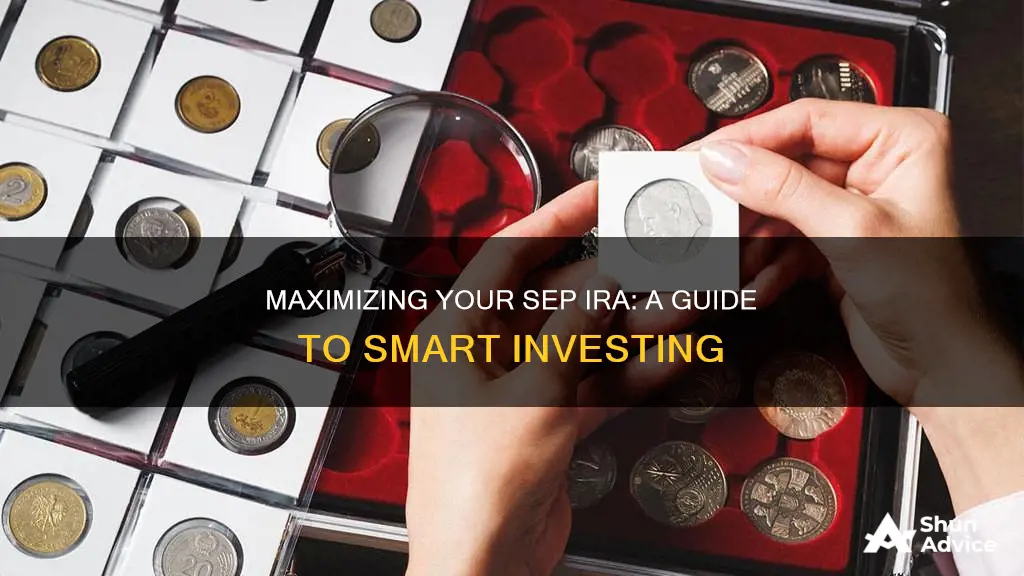
A Simplified Employee Pension (SEP) IRA is a tax-advantaged retirement account designed for self-employed people, small business owners, and freelancers. It allows employers to contribute to their employees' retirement savings, as well as their own. SEP IRAs are best suited for self-employed individuals or businesses with very few employees, as the employer is responsible for 100% of the contributions and must provide equal benefits to all eligible employees. The annual contribution limit for a SEP IRA is the lesser of 25% of the business owner or employee's compensation, or a maximum of $66,000 for the 2023 tax year and $69,000 for the 2024 tax year.
| Characteristics | Values |
|---|---|
| Type of account | Individual retirement account (IRA) |
| Who can participate? | Self-employed people, small business owners, and their employees |
| Contribution limits | Up to 25% of total compensation or a maximum of $66,000 for 2023 or $69,000 for 2024 |
| Individual contribution limits | $7,000 for the 2024 tax year ($8,000 for individuals over 50) |
| Investment options | Mutual funds, exchange-traded funds (ETFs), individual stocks, certificates of deposit (CDs), and bonds |
| Eligibility requirements | At least 21 years old, worked for the company in 3 of the past 5 years, received at least $750 in compensation in 2023 and 2024 |
| Deadlines | Annual deadline to open and fund a SEP IRA is the due date of the company's income tax return |
| Tax advantages | Earnings are tax-deferred, and contributions are tax-deductible |
| Withdrawal penalties | 10% penalty for withdrawals before age 59 1/2 |
| Minimum distributions | Required minimum distributions starting at age 73 |
What You'll Learn

Investment options
A Simplified Employee Pension (SEP) plan is a tax-advantaged retirement account designed for self-employed people, small business owners, and freelancers. SEP IRAs are funded by employer contributions, and employees are responsible for investing their own SEP-IRA accounts.
SEP IRA owners have a wide range of investment options available to them, with relatively few restrictions on the types of securities they can hold in their accounts. The Internal Revenue Service (IRS) does not permit certain asset types, such as collectibles and life insurance. The IRS also prohibits investors from using their SEP IRA funds to trade derivatives with undefined or unlimited risk.
The specific investment options available depend on the financial institution where the account is held. Most brokerages allow SEP IRA owners to buy and sell most securities and financial instruments, including:
- Stocks
- Bonds
- Exchange-Traded Funds (ETFs)
- Mutual funds
- Money market funds
- Certificates of Deposit (CDs)
Some brokerages restrict certain types of trading activity, such as options trading.
Uncover Mutual Fund Investments: PAN Power
You may want to see also

Eligibility requirements
To be eligible for a Simplified Employee Pension (SEP) IRA, you must be either self-employed or a small business owner. If you are self-employed, you must not employ others to be eligible for a SEP IRA.
If you are a small business owner with employees, your employees are considered "eligible" for a SEP IRA if they meet the following criteria:
- Are at least 21 years old
- Have worked for the company in three of the past five years
- Receive at least $750 in compensation in 2023 and 2024 ($650 in compensation for 2021 and 2022, and $600 for 2019 and 2020)
An employer can use less restrictive participation requirements than those listed, but not more restrictive ones. For example, an employer can choose to include employees who are 18 years old and have worked for the company for one year. However, the same eligibility requirements must apply equally to all owners and employees of a company.
Additionally, an employer can exclude the following employees from a SEP IRA:
- Employees covered by a union agreement and whose retirement benefits were bargained for in good faith by the employees' union and the employer
- Non-resident alien employees who do not have U.S. wages, salaries, or other personal services compensation from the employer
Fidelity Funds: Choosing the Right Investment for You
You may want to see also

Contribution limits
A Simplified Employee Pension (SEP) plan provides business owners with a simplified method to contribute towards their employees' retirement as well as their own retirement savings. Contributions are made to an Individual Retirement Account or Annuity (IRA) set up for each plan participant (a SEP-IRA).
The contribution limit for a SEP IRA for 2023 is the lesser of:
- 25% of the employee's compensation
- $66,000
For 2024, the contribution limit is the lesser of:
- 25% of the employee's compensation
- $69,000
If you're self-employed, your contributions are generally limited to 20% of your net income. The eligible compensation limit, indexed for inflation by the IRS, is $330,000 for 2023 and $345,000 for 2024.
The SEP IRA is an employer contribution, not an employee contribution, so it's made by the company rather than the individual worker. There are no catch-up provisions for older workers in SEP IRAs.
The maximum contribution is 25% of compensation, and all eligible employees must receive the same percentage. The definition of compensation differs depending on the business structure.
The annual deadline to open and fund a SEP IRA is the due date of the company's income tax return. The deadline to open and fund an account for 2023 is when the business files taxes in 2024.
If you're self-employed and looking for a way to contribute to a tax-advantaged retirement plan, a SEP IRA can be a good option. It offers you the chance to contribute a large sum each year and have your savings grow tax-deferred or even tax-free. A SEP IRA can be especially useful if you don't have any other employees and don't plan to hire any in the future.
Best Mutual Funds to Invest in Nigeria
You may want to see also

Tax benefits
A Simplified Employee Pension (SEP) Individual Retirement Account (IRA) is a tax-deductible retirement plan. It is a tax-deferred account, meaning contributions are made on a pre-tax basis and taxed when funds are withdrawn.
SEP IRAs are funded solely by employers, using tax-deductible dollars. For 2024, an employer can contribute up to 25% of an employee's compensation or $69,000, whichever is less. Employers can deduct payments to a SEP IRA for one or more employees up to set limits. Business owners who start a SEP IRA may be eligible for a tax credit of $500 or up to $5,000 per year, depending on the number of participating employees.
Self-employed individuals can contribute up to 25% of their net earnings to a SEP IRA, or the annual contribution limit, whichever is less. If you are self-employed, contributing to a SEP IRA will reduce your self-employment tax, as the contribution will lift business expenses, lowering net profit and, therefore, reducing self-employment tax and income tax.
Employees are not able to contribute to a SEP IRA, and the account is not tax-deductible for them. However, contributions they receive are tax-deferred. When money is withdrawn from the account, the account provider will issue a 1099-R to the employee to report any taxable distributions.
T. Rowe Price Funds: Cruise Investment Options Explored
You may want to see also

Rollover rules
A Simplified Employee Pension (SEP) plan allows employers to contribute to employees' retirement savings accounts. These accounts are known as SEP Individual Retirement Accounts (SEP IRAs).
When you leave your employer, you can roll over your SEP IRA account to a new or existing IRA. This gives you more control over your retirement savings and allows you to choose an investment strategy that suits your needs.
There are three methods to roll over your funds: direct rollover, trustee-to-trustee transfer, and 60-day rollover.
Direct Rollover
In a direct rollover, the financial institution holding your SEP IRA sends you a cheque payable to your new account. You then deposit the cheque directly into the new IRA, avoiding any tax liability.
Trustee-to-Trustee Transfer
In a trustee-to-trustee transfer, the two financial institutions work together to complete the rollover. This method also ensures that you avoid any tax liability.
60-Day Rollover
With a 60-day rollover, your current financial institution distributes the SEP IRA funds directly to you, and you then have 60 days to deposit the funds into your new IRA account to avoid taxes and penalties. If taxes are withheld, you are responsible for making up the difference when you redeposit the funds. You can only use this method once a year.
Rolling Over to a Traditional IRA
Because SEP and traditional IRAs are the same type of retirement savings account, you can roll over a SEP IRA into a traditional IRA without owing taxes.
Rolling Over to a Roth IRA
Converting a SEP IRA to a Roth IRA may trigger a taxable event and is subject to other restrictions. Whether this is a suitable option for you depends on your financial profile, including your income and ability to pay the tax on the Roth contribution.
Other Considerations
When rolling over funds, it is important to check if the receiving account can hold all the assets currently in the SEP IRA. Additionally, the plan administrator of the SEP IRA may not allow an IRA transfer, even though the IRS permits it.
Best Investment Fund Options: Where to Invest Money?
You may want to see also







